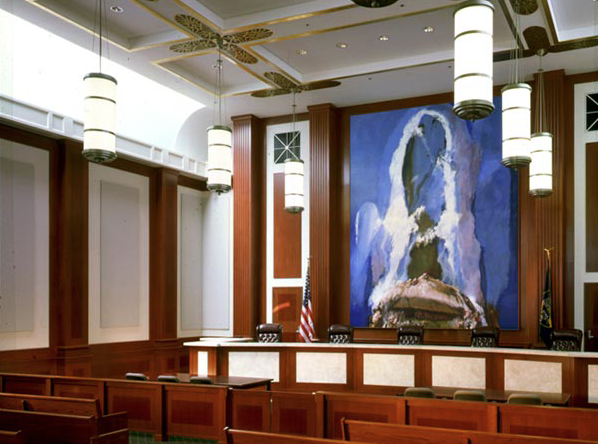Utah Supreme Court Reinstates Challenge to Repeal of Anti-Gerrymandering Initiative

This morning, the Utah Supreme Court revived a claim from advocacy organizations and voters alleging that the GOP-controlled state legislature violated the state constitution when it repealed a 2018 voter-approved anti-gerrymandering initiative.
Advocates are celebrating the decision as a win for direct democracy and a vindication of voters’ ability to fight back against rampant partisan gerrymandering.
“When Utahns exercise their right to reform the government through a citizen initiative, their exercise of these rights is protected from government infringement,” the unanimous opinion reads.
The ruling comes exactly one year after the justices heard oral argument in a 2022 case filed by advocacy organizations and voters who asserted that the Republican-controlled Legislature created a pro-GOP gerrymander after the 2020 census.
According to the suit, the Legislature engaged in unconstitutional partisan gerrymandering by splitting Democratic voters in Salt Lake County across the state’s four congressional districts — a move that eliminated Utah’s sole competitive congressional district and entrenched Republican power throughout the state.
As another key part of the lawsuit, the plaintiffs challenged the Legislature’s repeal of a 2018 voter-approved ballot initiative — known as Proposition 4 — that would have implemented anti-gerrymandering rules and required the Legislature to adopt a redistricting proposal drawn by an independent, citizen-led redistricting commission.
Ahead of the decennial 2020 redistricting cycle, the Utah Legislature supplanted Proposition 4 with its own law that nullified the initiative’s prohibition on partisan gerrymandering. Lawmakers also selected their own congressional districts and ignored redistricting proposals submitted by the state’s independent commission.
While the Legislature argued that it is permitted to repeal citizens’ initiatives, the justices held today that “government-reform initiatives are constitutionally protected from unfettered legislative amendment, repeal, or replacement.”
“Although the Legislature has authority to amend or repeal statutes, it is well settled that legislative action cannot unduly infringe or restrain the exercise of constitutional rights,” the opinion continues.
The opinion further reasoned that Utahns’ right to reform their government via a citizen initiative is a fundamental right, meaning any laws that might infringe upon that ability are subject to the highest standard of judicial review.
The case made its way to the Utah Supreme Court after a lower court judge largely allowed the plaintiffs’ claims to proceed in an October 2022 ruling. In that ruling, the judge concluded that partisan gerrymandering claims are actionable under the state constitution, but dismissed the plaintiffs’ argument seeking to reinstate Proposition 4 — prompting both GOP lawmakers and the plaintiffs to appeal to the state’s highest court.
While the court reinstated the plaintiffs’ claims against the repeal of Proposition 4 in today’s ruling, it did not reach the other question presented in the case, which centered on whether Utah courts can review partisan gerrymandering claims brought under the state constitution. The justices noted that they might address the partisan gerrymandering question at a later date if necessary.
The case will now return to the trial court for further proceedings consistent with the court’s opinion.